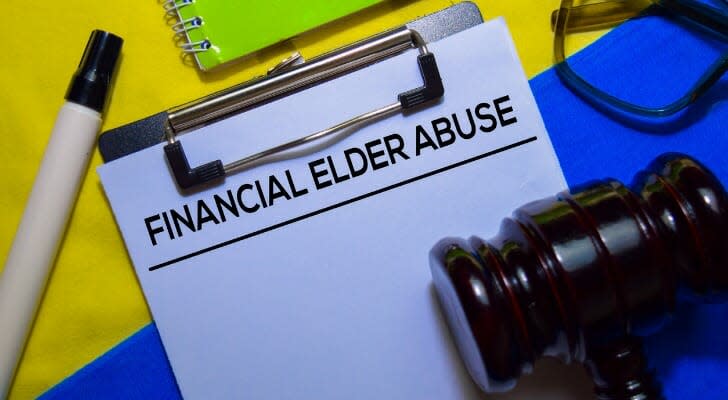Use the Holidays to Help Older Relatives Identify and Avoid Elder Financial Abuse
The holidays are a time when far-flung relatives get a change to reconnect with relatives, especially after the disruptions that the COVID-19 pandemic created during the past two years. Family members visiting elderly relatives can use the occasion to keep an eye out to make sure that parents, grandparents and other family members are being financially abused. Here are some tips on doing that well. Consider working with a financial advisor as you create or modify a retirement plan.
Signs of Elder Financial Abuse
According to the National Council on Aging, up to 5 million older Americans are financially abused every year, with the total loss suffered by victims estimated to be at least $36.5 billion.
The signs of elder financial abuse can include any sudden changes in an older person's financial situation, the council says, including unpaid bills, fraudulent signatures on financial documents and "unusual or sudden changes in spending patterns, will or other financial documents."
Other indicators are that the person is receiving substandard care, malnutrition, depression, anxiety or receiving unnecessary or excessive services.
Forms of financial abuse can include outright theft of cash, credit cards, checks or valuable property, forging checks, draining retirement accounts or taking Social Security benefits, unauthorized use of the older person's credit cards, opening accounts in that person's name, changing names on bank accounts, insurance policies or title to a home, vehicle or other property. Healthcare fraud also is an issue, including overcharging, billing for twice for the same service or for unneeded or unused services and falsifying insurance claims.
Sources of Elder Financial Abuse
Perpetrators of financial abuse can include caregivers, other relatives, strangers who suddenly befriend an older person and even scam artists posing as romantic partners.
If you suspect a relative or someone else has been a victim of elder financial abuse, the Administration for Community Living has a National Center on Elder Abuse that explains how to report abuse, where to get help and state laws that deal with abuse and neglect. Another resource is the AARP Fraud Watch Network (877-908-3360), which explains how to spot fraud or get help and guidance.
Avoiding Elder Financial Abuse
To prevent financial abuse, discuss having an older relative designate someone with their financial power of attorney, allowing someone to monitor their bank, investment and other financial accounts, adding a trusted contact to financial accounts and signing them up with services such as LifeLock and EverSafe that monitor accounts and report suspicious events, such as missing deposits, unusual or abrupt withdrawals and significant changes in spending. A concerned relative also can meet, vet and observe caregivers and stay in close contact to be aware of what's happening in the relative's life.
Making bank accounts payable on death (POD) to whomever the elderly person wants to receive the money means that person only can access the funds once the elderly person dies. Other tips for protecting bank accounts include:
Set up direct deposit for Social Security benefits, pension payments and other benefit checks so that paper checks can't be stolen
Use unique passwords for each bank account login and store them in a secure password keeper
Opt for electronic statements or if you prefer paper statements, shred them after reviewing them each month for errors or unusual transactions
Set up banking alerts to notify you when new debit or credit transactions post or when new online banking login attempts are made
Outside Help
One resource to set up financial help is the Eldercare Locator (800-677-1116) operated by the Administration on Aging, which can help connect older people and their families to experts and services, including free or low-cost legal assistance.
One option for far-away relatives is hiring a daily money manager to help them manage their ordinary financial matters, such as paying bills, reviewing insurance bills, compiling tax documents and monitoring accounts and other money-related matters. The American Association of Daily Money Managers requires its members to be registered, insured and to provide ongoing background checks to clients. The association also offers a directory of registered money managers.
The association also publishes a list of state and local agencies that provide free or reduced fee services to the elderly, disabled and others with limited financial means.
The Bottom Line
Elder financial abuse is a broad term that describes the theft, fraud or otherwise misuse of an elderly person's assets. Seniors can be targeted for fraud scammers but it can also happen within a caregiving or family setting. Elder financial abuse is problematic for victims as it can deprive them of much-needed resources to meet daily living expenses or pay for larger expenses, such as long-term care. Building some protections into your estate plan can help to insulate your assets against this type of financial abuse.
Tips on Finances for the Elderly
A financial advisor can offer insight and guidance for protecting elderly loved ones from aabuse. If you don't have a financial advisor yet, finding one doesn't have to be hard. SmartAsset's free tool matches you with up to three vetted financial advisors who serve your area, and you can interview your advisor matches at no cost to decide which one is right for you. If you're ready to find an advisor who can help you achieve your financial goals, get started now.
One issue you may have to contend with is the question of guardianship and conservatorship. Guardianship gives someone else the right to make decisions on someone else's behalf; conservatorship extends that right to financial decision-making. Either one may be necessary if you are no longer able to care for yourself and don't have a power of attorney or financial attorney in place. You may also run into this with your own aging parents. So consider how your estate plan may need to account for those scenarios.
Photo credit: ©iStock.com/PeopleImages, ©iStock.com/Johnny Greig, ©iStock.com/syahrir maulana
The post Use the Holidays to Help Older Relatives Identify and Avoid Elder Financial Abuse appeared first on SmartAsset Blog.




